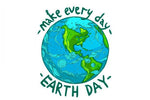
Earth Day Matters - Here’s Why
, by Planet Green, 3 min reading time

, by Planet Green, 3 min reading time
Once a year people tend to clean through their homes and recycle clothing, books, games and electronics they haven’t used in the past year. It does provide some relief, but there’s something we can all consider that we do virtually every day. Shopping.
Since 1970, people have celebrated April 22nd as Earth Day. It marked the start of an environmental movement that drives clean-up campaigns, tree-planting and educational initiatives to raise awareness about the environmental challenges facing our planet. As we move through the month of April, we’re likely to see an abundance of environmental advertising, but Earth Day represents something we should be considering all year, every year. The choices we make on a daily basis have a long term affect on the environment.
Once a year people tend to clean through their homes and recycle clothing, books, games and electronics they haven’t used in the past year. It does provide some relief, but there’s something we can all consider that we do virtually every day. Shopping. We often think of recycling as something we do at the end of a product’s lifecycle, but what we choose when we purchase a product makes a bigger difference.
The items we purchase often come from manufacturers outside of the United States. This includes clothing, TV’s and entertainment devices, electronics and of course - ink cartridges. The standards and practices other nations have for creating consumable products aren’t always in alignment with the standards we have in the U.S. and as a result, your purchase may be supporting and building an economy that doesn’t support the environmental goals you have. It might be easy to acquire and cost less out of pocket, but your purchase might be adding to the very issues addressed by celebrating Earth Day.
Purchasing products made in China has led to a rapid economic growth cycle and it has resulted in a manufacturing boom. Along with that rapid growth has come accelerated environmental issues including hot button topics like Air Pollution. China is known for having some of the world's worst air quality, with many of its cities consistently ranking among the most polluted in the world. The major contributors to that air pollution are industrial manufacturing, transportation, and power generation - all requirements for China to produce low quality and non-recyclable products, like clone ink cartridges.
Alternatively, in the U.S., Planet Green Recycle remanufactures ink cartridges without the need to create new plastics, or to use natural resources to make single-use items that fill landfills on a daily basis. By remanufacturing OEM ink cartridges, Planet Green Recycle creates virtually new ink cartridges using materials that would otherwise be put into landfills had they not been recycled. This reduces the landfill waste problem and provides ink cartridges without the expense of Greenhouse Gasses made from cross-ocean transport and without the need to deplete natural resources for manufacturing. It also means consumers can acquire ink cartridges at highly reduced costs.
Because generic aftermarket clone cartridges, often called "compatibles," are not recyclable or suited for remanufacturing, they end up in landfills, becoming a big part of the U.S. Land Pollution issue. From large amounts of solid waste, such as packaging materials, plastics, and other electronic waste; imported products that aren’t recyclable lead to land pollution that contaminates soil and groundwater. Purchasing low-cost third party "compatible" cartridges from overseas manufacturers supports an industry that adds to the environmental issues plaguing the U.S. landscape.
Ink cartridges alone aren’t what making better shopping choices is about as we consider Earth Day. Ink cartridges are one of millions of products made overseas and the purchase of those products adds to the support of non-sustainable manufacturing practices and takes away from the U.S. economy.
As Earth Day is celebrated through the month of April, we should consider the habits we have in making product purchases as well as recycling and look at the opportunities we have to support U.S. based sustainable manufacturers, remanufactures and companies that support a circular economy.

Plastic is designed to be durable. That durability makes it useful during a product’s life - but it also means plastic remains long after its...

Modern consumption moves fast. Products are manufactured, used briefly, and discarded—often in rapid succession. This constant motion drives resource extraction, increases waste, and places growing...

Environmental impact doesn’t reveal itself on a daily schedule. It doesn’t spike immediately after something is thrown away, and it rarely produces instant consequences. Instead,...

When people think about environmental responsibility, attention often goes to the biggest and most visible problems—industrial pollution, overflowing landfills, or massive plastic debris. While those...